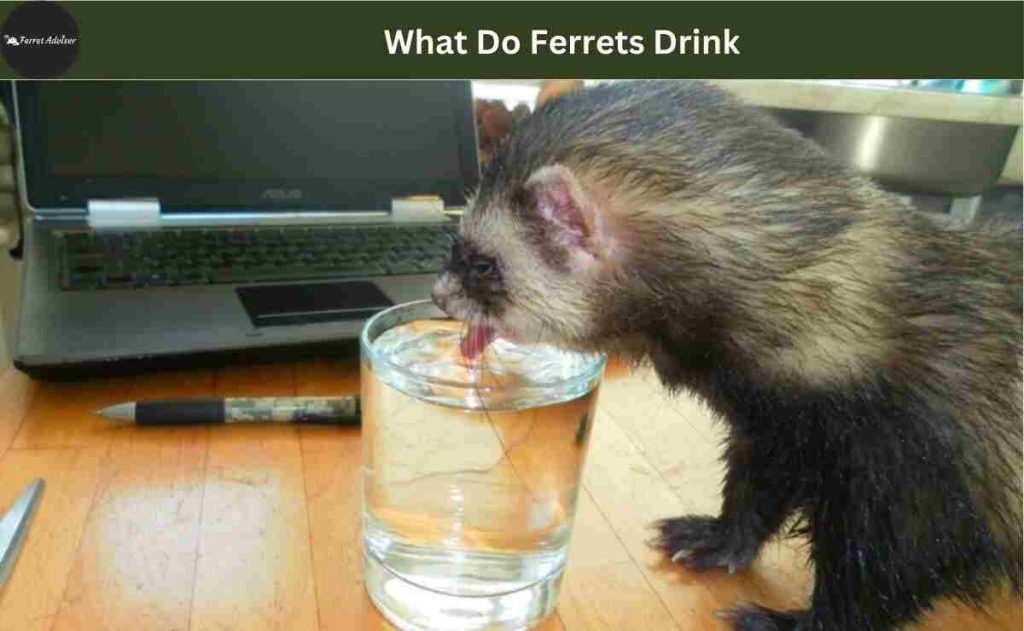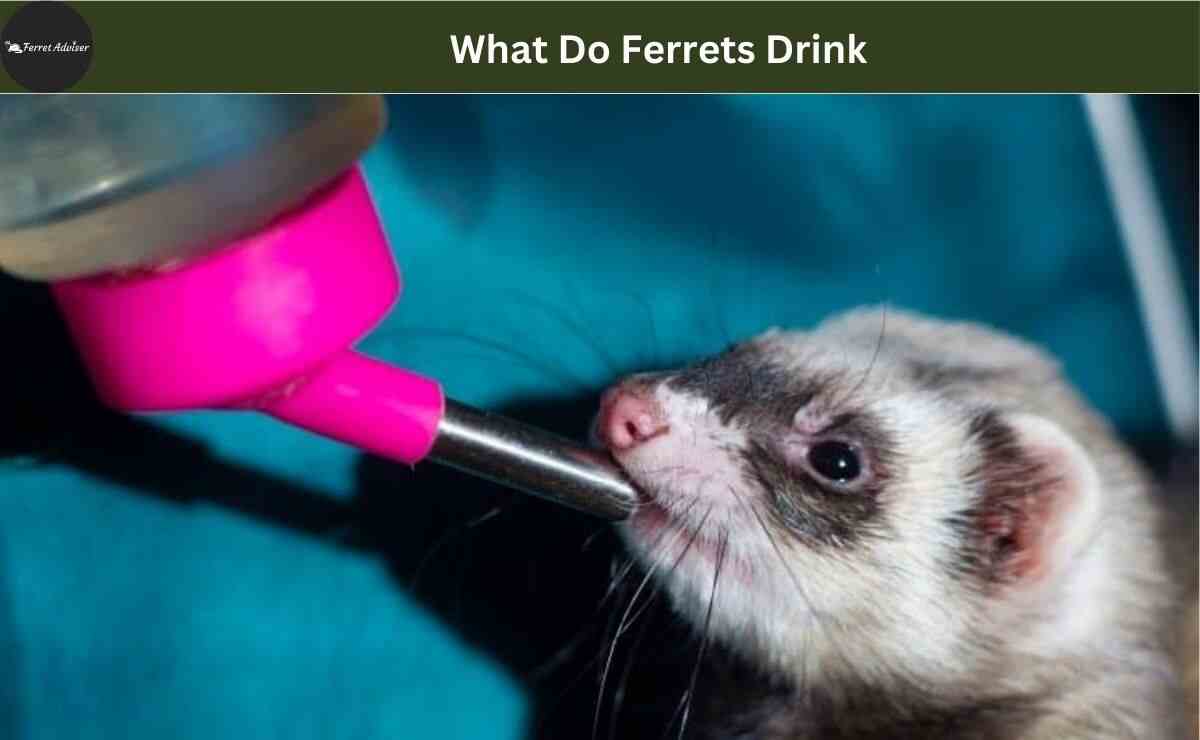Unlike humans, ferrets don’t drink all types of drinks. So, you need to pay extra attention to your ferrets’ drinking essentials. Sometimes, ferrets can’t even drink milk due to the lack of necessary enzymes.
So, what do ferrets drink? To maintain good health, ferrets require water. You should give your ferret water first and foremost. You can give your ferret water in a variety of containers, including bowls and bottles. Hereby, you should be familiar with your ferret’s specific needs.
But what other things can and can’t ferrets drink? Let’s explore it altogether!
What Do Ferrets Drink?

Ferrets mainly drink water to maintain good health. There’s no hard and fast rule, but they must get enough water. Depending on its size, activity level, and other personal demands, a healthy ferret might go as many as twenty times per day to its water dish.
Providing ferrets with water that is safe is vital. Chlorine and fluoride are two of the many pollutants found in municipal water systems. While these probably won’t hurt your ferret right away, they could be harmful in the long run.
Despite its apparent usefulness, distilled water is deficient in vital elements. Your ferret’s nutritional balance, which includes essential nutrients like magnesium, can be upset by the distillation process, which eliminates pollutants and critical minerals.
Keep ferrets away from water that is ionized, oxidized, or polarized. Knowing the source of bottled water is essential, even though most of it is safe to drink. Additives are added to some bottled water, making it a little more than tap water.
Also, ferrets can safely drink filtered water. It keeps vital nutrients while avoiding unnecessary additions. So, ensure it continues to be a healthy source of essential minerals by looking for bottled spring water or filtered water.
How Do You Give A Ferret Water?
Ferrets need to have their water and food bowls emptied frequently. Use non-spill bowls or tape the bowls down to make sure they won’t topple over. This way, your ferret won’t be able to knock them over, and they’ll always have water on hand.
The spout of rodent water bottles could damage ferrets’ teeth, therefore it’s best to avoid using them. They should use a different kind of water container because their oral health should be a top priority.
Ferrets wake up around once every four hours to eat, and they have a quick metabolism. Their thirsty nature necessitates a constant supply of water throughout the day. Their hydration and general health can be better maintained if you keep their water dish filled and securely placed.
Can Ferrets Drink Tea?
Tea and anything else with caffeine in it should not be given to ferrets. The health of your ferret could be jeopardized due to caffeine’s harmful effects on their central nervous system and heart.
On top of that, ferrets can’t handle high sugar levels and have poor glucose tolerance. They run the risk of developing health problems if they eat sugary meals.
Can Ferrets Drink Coffee?
Because of the caffeine, ferrets should never drink coffee as well. Because of their sensitivity, ferrets can feel the effects of coffee even in trace levels.
Ferrets put themselves at risk when humans add sugar and milk. Small tumors in the pancreas called insulinomas can develop in ferrets that consume too much sugar over a long period. However, coffee, even without sugar or cream, can be harmful to your ferret’s health in the long run.
Can Ferrets Drink Carbonated Beverages?
Soda and other fizzy drinks include a lot of sugar and other ingredients that ferrets should never consume. Even while ferrets’ attraction isn’t completely clear, once they try it, they develop a strong addiction that can be hard to resist.
Ferrets may get sick from drinking carbonated drinks because their bodies can’t process the sugar, gasses, and flavorings found in them. On the other hand, they may accidentally consume harmful substances due to their strong preference for liquids. So, it’s better to keep the coffee away from your pet ferret.
Can Ferrets Drink Milk?
Because they are predominantly carnivores, ferrets need a diet high in meat protein. They do not possess the enzymes necessary for milk. Providing milk to your ferret might cause diarrhea, dehydration, and potentially the need to visit the clinic.
Dairy products should be handled with care, even though it may seem natural to offer ferrets milk. Although ferrets like milk, it’s not the healthiest option for them because they can’t process lactose. They risk nutritional imbalance and health problems if they drink only milk for fluids.
Giving your ferret tiny amounts of heavy cream is one option for introducing dairy to its diet. If they are underweight, this can help them gain a little weight. But don’t make it a staple in their diet; instead, give it to them occasionally.
Some Tips To Keep Your Ferret Hydrated
If your ferret is showing signs of dehydration, here are a few tips to consider to keep it hydrated:
- Choose The Right Water
Distilled water does not include minerals and tap water could have additions. To be well hydrated, drink spring water from a bottle or with a filter. Make sure you read the labels to stay safe.
- Ensure Cleanliness
Keep water bowls or bottles clean regularly to stop the formation of bacteria. Illness might result from ignoring cleaning. Add soapy warm water and fill up with new water every day.
Baking soda or vinegar can also remove stubborn residue. Stay away from bleach because the residue can irritate the ferret’s stomach.
- Think About Ferret Preferences
Research indicates that ferrets are more comfortable with bowls. Placing a dish beneath the cage, secure water bottles on top. For effortless cleanup, select a bowl that is both size and dishwasher-safe.
Conclusion
Lastly, ensuring a healthy ferret is in your hands. So, knowing what do ferrets drink will now give you the key to what to do and what to avoid. Therefore, always make sure that your ferret has constant access to fresh water.
Also, keep in mind the potential dangers of giardiasis. Loss of appetite and overall weight loss are symptoms that could be caused by protozoa in polluted water. As soon as symptoms appear, take your pet to a vet for evaluation and treatment.
